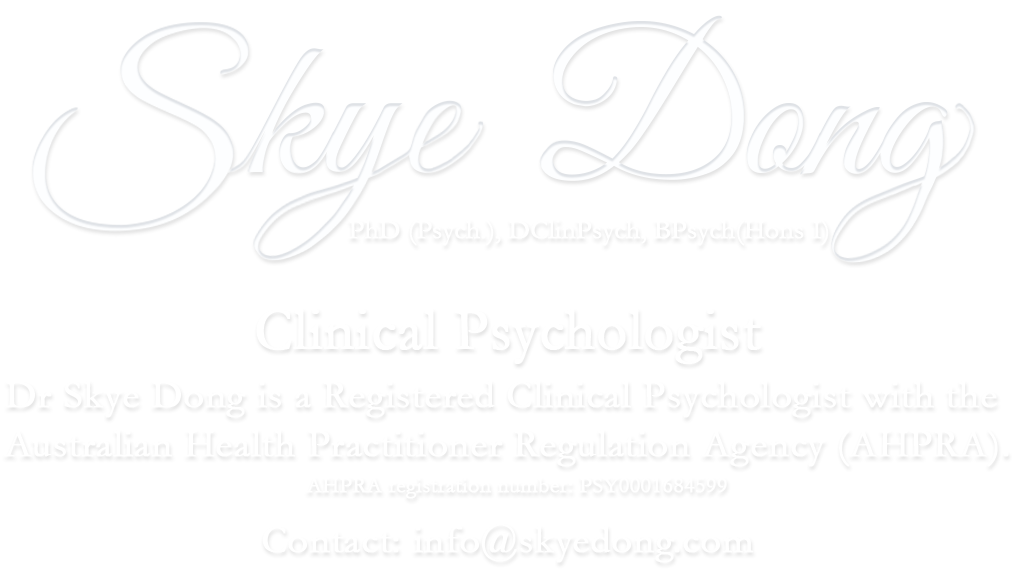


Therapy is both structured and creative: two people enter the space at a predetermined time with a shared objective, but no one really knows how the session will unfold. The session evolves dynamically, out of things one chooses to say, the shared symbolisation of thought and language, and the connections that emerge in the moment.
I aim to improve people’s lives by providing a safe space to work through emotional distress, in all its forms. Successful therapy is a collaborative experience between two people, built on a trusting therapeutic relationship, empathy, and understanding. I pursue this goal through providing direct clinical care (individual and group therapy) and through my interests in ongoing academic research, program development, and clinical supervision of trainees.
I hold a dual PhD and Doctor of Clinical Psychology, and a Bachelor of Psychology (Honours I) from the University of Sydney. I have over a decade of clinical and research experience in hospital, private practice, and not-for-profit settings.
Along with more common issues of anxiety and mood, my expertise is in working with those going through major life transitions. This includes adjustment to loss, illness, chronic health conditions, and complex trauma (C-PTSD). I have recently co-authored a book on managing cancer pain, developed an accompanying app, spoken about grief and trauma, and continue to engage in active research.
Qualifications
I began and completed my training at the University of Sydney. I was awarded the University of Sydney Martin & Elizabeth Jane Simmat Prize No. 1 for the best candidate in the final year of the program. My PhD explored ways of optimally managing cancer-related symptoms for patients and their families.
Clinical Experience
I have been practicing since 2012 in a variety of settings seeing patients, families, and teams often confronted with major life changes. I am highly experienced in working with patients and families with chronic pain, cancer, stroke, spinal cord injury, life limiting illnesses, and various medical conditions, in both individual and group therapy contexts. I have a special interest in working with individuals encountering adjustment difficulties and symptoms of complex trauma/C-PTSD. Some Sydney-based major hospital settings where I have worked as a clinical psychologist include:
Outside of private practice, I am currently a postdoctoral researcher/clinician at HammondCare Greenwich Hospital and a Senior Clinical Psychologist at the Melanoma Institute Australia. I am also a board-approved supervisor and provide supervision to clinical psychologists, provisionally registered psychologists and clinical psychology registrars. I am fluent in Mandarin Chinese.
Why seek therapy?
I believe therapy helps people build trust, authenticity, and love within themselves and therefore with others. It’s both a science and an art. You may want to understand yourself in new ways, think about enduring concerns, manage a crisis or relationship, or simply to feel more content. Effective therapy can alleviate suffering, permit life to be lived with increasing flexibility, allow authentic freedom to be oneself, and develop a greater sense of ‘reason for being’. The most important thing to consider when finding a therapist is how they make you feel when you talk to them, rather than the type of therapy they practice.
I utilise both short-term and long-term therapies and customise therapy based on the person and the problem. My approach to therapy is holistic, evidence based, and integrates multiple theories, with particular emphasis on relational, psychodynamic, and trauma-informed ways of thinking. I provide individual therapy for adults and adolescents experiencing a range of issues, including:
Resilience factors, the impact of one’s adverse early life events, and intergenerational patterns of relating, including issues such as culture, migration, colonisation, and societal constructs are vital considerations in my approach to therapy. The range of evidence based therapeutic modalities I use include:
I am actively involved in continuing professional development, particularly in areas of trauma-informed practices of care, psychodynamic and relational modes of thinking. I am also informed by research and am an active researcher in the areas of post-traumatic growth and meaning-making after trauma and loss.
I have co-authored a book for cancer patients and families covering psychological techniques for managing cancer pain, see The Cancer Pain Book for more information. I also co-designed the accompanying Cancer Pain App for patients, which is free to download from the Apple and Google stores. Articles about the resources can be found here and here.
I have co-designed an online group therapy program for people with spinal cord injury to explore the concepts of meaning, purpose, grief, and post-traumatic growth, see The Engage Program for more information.
A selection of my peer-reviewed publications include:


Please contact me to discuss. Session fees are below the APS recommended rates. Rebates are available for patients with a Medicare Better Access Mental Health Care Plan or private health funds.
I believe therapy should be affordable to individuals and families. I offer reduced fees for people facing financial hardship, pensioners, health care card holders, and full-time students.
Please feel free to make contact by email or phone (call or sms) to discuss any questions you may have before deciding whether I'm the best person to help you with your concerns. I primarily practice via telehealth/video conferencing for all consultations.
Limited face-to-face consultations are available at Gordon (17km from CBD Sydney).
Email: info@skyedong.com
Phone: 0404 633 767
Strelitzia Consulting Rooms
Suite 6, Level 2, 924 Pacific Hwy
Gordon NSW 2072
Medicare Provider number 5192053W
Access to the practice is fully wheelchair accessible.
Studio Eight Consulting Room
Suite 8, 95 Fullers Rd (enter via Greville St)
Chatswood NSW 2067
Medicare Provider number 5192054F